In a Nutshell:
- Fantasy sports APIs are the fundamental units of a fantasy app that allows realtime updates.
- Real-time data processing of fantasy sports APIs serves as a bridge between real-world data and the fantasy sports app environment, giving users a unique experience.
- Official API data can be leveraged to build user confidence through unbiased and accurate information, while eliminating the need for manual data updates.
- Through real-time data processing of Live APIs, help in building a solid solution that speaks to a diverse audience, supporting multiple sports.
- Nimble AppGenie can help in integrating the right fantasy sports APIs that make the solution easily adaptable to the latest updates in any sport through real-time data processing.
Fantasy sports today have given a new dimension to every kind of sport, from cricket to volleyball. Also, it has encouraged even people not interested in various sports.
The magic of fantasy sports apps has even helped millions of people win exciting prizes, which changes their lives.
People can create their own fantasy team as per the players’ data from real games, and their fantasy game score & rank are based on real-time data of the live game.
How is this becoming possible? All the credit goes to the Fantasy Sports API.
Are you new to this? Don’t worry, we have broken down everything that you must know to develop a fantasy sports app by integrating an API.
What is a Fantasy Sports API?
The Fantasy Sports API is best defined as the software that acts as an intermediary between the fantasy sports app and external sports data providers.
It is a very important tool that completely changes how the fantasy sports app works. The fantasy sports APIs enable the app to provide features to the users like player statistics, match schedule, live score, and the performance of the players.
The data provided by the API lets users make smart choices that boost the chance of their winning while playing live games. The API integration makes the app faster and more reliable.
The role played by the fantasy sports API includes the following:
- Live match score and players’ statistics
- History of the player’s performance data
- The official schedule, rosters, and injury updates
- The rules and format of scores of different sports
- Update fantasy scores with the event triggers, i.e., goals, wickets, touchdowns, etc.
Earlier, the fantasy sports app used to allow play of only cricket, but things have changed with the use of APIs. Now, fantasy sports apps are allowing their users to play more fantasy sports like football, basketball, tennis, soccer, and more.
Why Invest in a Fantasy Sports API?
We have some Fantasy Sports Statistics that tell you why you should invest in its development. In 2024, the value of the global fantasy sports market was $32.21 billion, which is expected to grow to $36.75 billion by 2025.
It is now expected that by the end of the year 2033, the global fantasy sports market size will reach $105.58 billion. So, between the years 2025 and 2033, the fantasy sports market size will grow at a CAGR of 14.1%, which is huge.
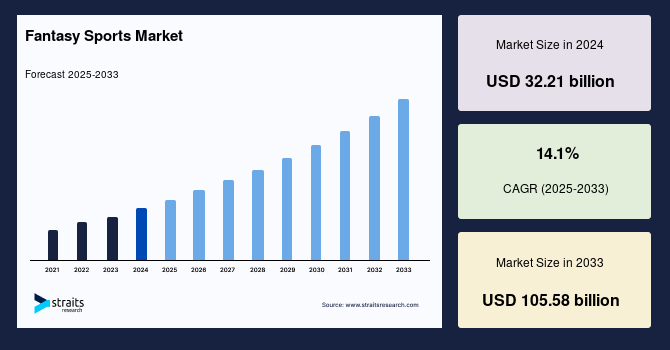
The above statistics clearly indicate that the demand for fantasy sports apps is increasing. There are no other strong reasons to invest in a fantasy sports platform like these. Thus, it is the best time to build a scalable app integrating the right API to offer the best user experience.
Different APIs Used in a Fantasy Sports Application
Now that you are aware of what a fantasy sports API is, let’s take a look at different APIs that fall into this category. When building an application, there is a lot of data that you need to fetch for your users.
From season schedule to individual player stats, everything has to be shown, and for each of these data streams, there is an API.
Check out the following table to identify the different APIs used in the fantasy sports application.
| Match API | Season API |
| Team Performance API | Season Points API |
| Player Timeline API | Season Stats API |
| Team Timeline API | Player Stats API |
| Season Team API | Recent Matches API |
| Chat Bot API | Match Points API |
| Recent Season API | Player Performance API |
| Schedule API | Player vs Team Performance API |
Why Does A Fantasy Sports App Need A Strong API?
If you are planning to invest in a fantasy sports app, then you must consider integrating strong APIs into it. In the landscape of fantasy sports apps, data from every second plays a crucial role in increasing the winning chances of users.
Thus, API integration in fantasy apps isn’t just an option; it is an essential step. You must be thinking, why are we saying this? The reasons are listed below.
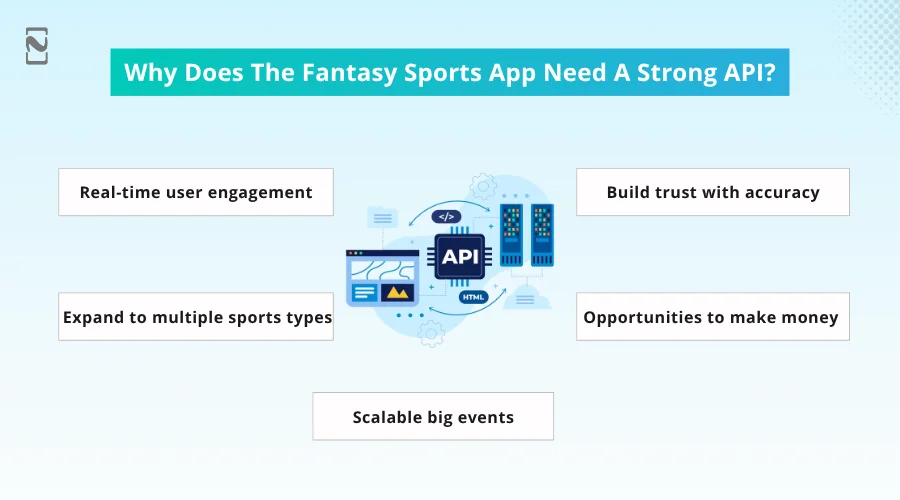
► Real-Time User Engagement
The fantasy sports app allows users to play a virtual version of live games. So, it is very important for users to get updates on the real-time performance of the players, when goals are scored, who was substituted, who got injured, and more.
The changes in the data must reflect on the app every second. The live score API for fantasy apps takes charge of this and auto-updates team scores on the app as fast as they happen on TV, which offers real-time user engagement.
► Build Trust With Accuracy
For fantasy sports app users, trust is the real currency when they invest money to play fantasy games. With the integration of a real-time fantasy sports API, the app owner can dodge the doubts of users. As the API will provide consistent data and calculate the points correctly, it will build app fairness.
With a strong API, you can ensure the data is coming from official and verified providers, calculate the points using consistent and transparent rules, and eliminate human error with manual updates.
► Expand to Multiple Sports Types
Using a fantasy sports API, you can expand the scope of your application by integrating multiple sports. With the help of fantasy sports API integration for multiple sports, you can choose the sport you want to offer to your users and integrate the API for the same.
| Here are the sports that our API integration services cover | |
| Fantasy Cricket API Integration | Fantasy Football API Integration |
| Fantasy NFL API Integration | Fantasy NHL API Integration |
| Fantasy NBA API Integration | Fantasy MLB API Integration |
Thus, this bridge will allow your app to support multiple sports within one app without rebuilding the app backend.
Can add new sports that are trending due to seasonal or regional demand. Customize the score as per the sport without breaking into each other.
► Opportunities to Make Money
Fantasy sports apps make an excellent platform for users to win exciting prizes and a large amount of cash. The Fantasy Sports Platform API can connect seamlessly with the payment gateways, making it easy for users to collect cash prizes securely in their bank accounts.
Additionally, to play fantasy games, users have to invest money in the games to get entry, which can also be seamlessly done because of the payment gateway. Daily fantasy sports API makes it easy for users to play fantasy games and make money.
► Scalable Big Events
Today, big sports events have started to bring excellent traffic to the fantasy sports app, with the expectation of making big wins. The fantasy API integration prevents the apps from crashing due to the heavy load from the sudden traffic spike.
Thus, the API saves the fantasy app from facing downtime and heavy loss of revenue. Ensure you choose a strong API because that will balance the load by evenly distributing the requests. Offers cloud auto-scaling to safely serve during times of high demand and also optimise data queries.
How APIs Leverage Real-Time Data Processing in Fantasy Apps?
With the help of live data APIs, fantasy apps make a user’s experience completely in sync with the real-time updates. Real-Time Data Processing in Fantasy Apps works as its backbone as it offers some of the most important features to boost engagement, keeping users always on their toes.
With the benefits of live scores, dynamic leaderboards, reduced drop-off, and interactive updates from the game, real-time data processing is the ultimate requirement for modern-day fantasy sports apps.
Fantasy sports APIs can easily make it possible.
You must be curious to know how a fantasy league API works and how it enables real-time data processing, as it so seamlessly shows the score directly on the app and also helps users to choose a team.
So, here is a technical breakdown that tells you how the score travels from the live match to the user’s fantasy sports app.
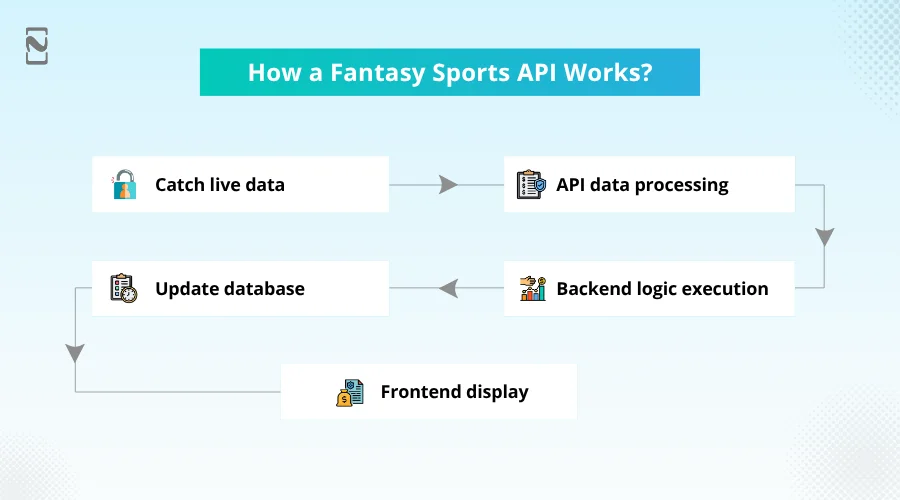
1. Catch Live Data
Numerous official sports data providers have teams and technology that watch every live match. The data providers are SportsRadar, Entity Sports, etc. They collect data from every action, like goals, runs, wickets, etc, of live sports and source them to the fantasy sports apps via live data APIs.
These data are timestamped and are tagged with player ID, match ID, and event type. Some API providers leverage AI in Sports apps to offer more dynamic, predictive, and personalized data.
2. API Data Processing
After successfully capturing the data from the live sports, the API for fantasy league management will process the information. This process removes errors, duplicates, or inconsistencies.
Then, perform data structuring, which converts the raw input to a standardised format so that the app can understand it. Lastly, fitting the data with the relevant ones sends it to the app.
3. Backend Logic Execution
Now, the backend system of the fantasy app will take charge. The app’s backend will match the player ID with the roster of the fantasy team.
Further, it applies the scoring rules that have been set for the application. Now, this will automatically calculate the updated totals for each team of the fantasy sports app.
4. Update Database
After the backend system of the fantasy app recalculates each of the points, all the updated leaderboards, team scores, and players’ stats are stored on the app’s database.
This will ensure that when users log in, each of them sees the same consistent numbers. The app will also keep historical match data to offer users analytics, players’ performance, and dispute resolution.
5. Frontend Display
Now, lastly, comes the front end of the app. All the updated data and information regarding the matches will now be fetched by the app’s user interface to show it to the users.
These steps will repeat in a loop, and the app interface will refresh automatically without the need to reload the page. When the rank changes in the live game, it will be updated in the app. Lastly, push notifications will keep the users engaged during the big event.
Popular Fantasy Sports APIs We Integrate
You should know that there are various popular third-party APIs for the Fantasy App to integrate. These APIs make it possible to make the concept of fantasy sports apps successful.
Thus, below we have mentioned a few of the best fantasy sports API providers for your knowledge.
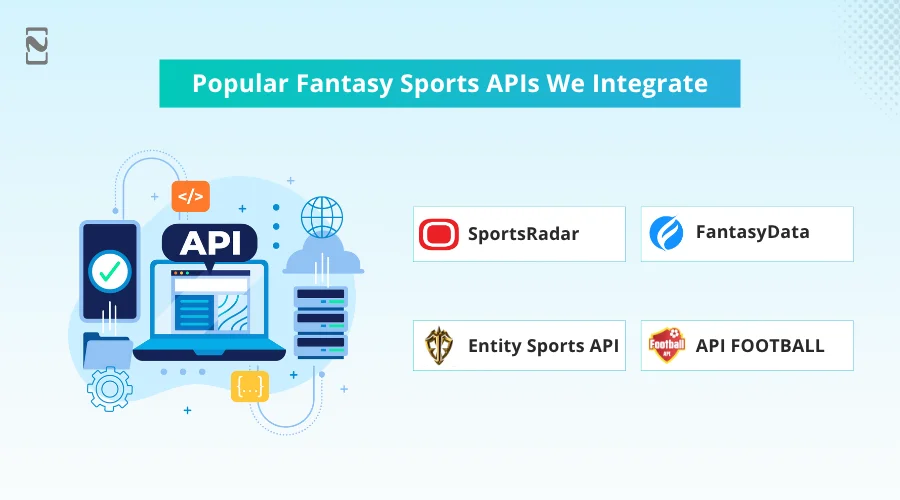
➤ Yahoo Fantasy Sports API
The Yahoo Fantasy Sports API enables developers to seamlessly integrate Yahoo Fantasy Sports data into their applications. Currently, the APIs support retrieving Fantasy Football, Baseball, Basketball, and Hockey data, including game, league, team, and player details.
➤ SportsRadar
Sports Radar is one of the biggest names among third-party API providers globally. The API provider partners with global sports and leagues organisers to provide them with accurate and licensed data.
➤ FantasyData
Another top name among third-party API providers is FantasyData, which is especially popular in the US. This API provider offers sports data to American sports like football, basketball, baseball, and similar to the global providers.
➤ Entity Sports API
Entity Sports API offers excellent coverage of a variety of cricket tournaments with its data. This provider offers data and information related mainly to Asian sports. It is a global brand and provides detailed player stats.
➤ API-FOOTBALL
As the API FOOTBALL, this third-party API provider offers dedicated data for football and soccer games. It provides data on leagues that have global coverage and has a record of covering more than 1000 football leagues globally.
Other than third-party API providers, app development companies offer a custom fantasy sports API. This will fulfill the specific needs of the app’s business models and user experience. It comes with 100% flexibility, no dependencies, and meets desired needs.
Fantasy Sports API Development Cost
If you are planning to score big with a fantasy app integrating a powerful API, you must know how much it is going to cost you. So, the cost to develop a fantasy sports app along with API integration will be between $5,000 to $20,000, and more.
Various factors determine the app development cost, which include complexity, features, fantasy sports app tech stack, developers’ location, and many more.
If you want to develop a simple app, then it will cost less than $20,000. However, if you are planning to build a full-stack fantasy app with the latest and advanced technology & features, it may surpass the amount of $150,000 and more.
Why Partner With Nimble AppGenie For Fantasy Sports API Development?
Planning to bring a fantasy app to life? It will be a great investment, looking into the craze of sports lovers. On this journey, Nimble AppGenie will be the perfect partner with expertise in how to turn fantasy into a winning reality with an API.
To offer an excellent user experience with on-time scoreboard updates on the app, you need APIs to play an important role.
We will turn your fantasy sports vision into an app from scratch, will do third-party API integration or bespoke API creation seamlessly, integrate AI & ML in Fantasy Sports Apps, and will do everything that your app needs.
Partnering with the best fantasy sports app development company, Nimble AppGenie, means you will get a team that has an excellent understanding of the fantasy sports business models, fan behaviour, and technology.
Conclusion
So, you know this well now that the backbone of a successful virtual sports app is the Fantasy sports API. We will offer your fantasy app to offer real-time engagement, accurate sports data, and scalability to the users.
You have gained a good knowledge in this matter and know it’s something more than simple integration. It’s time for you to launch your fantasy sports empire by integrating an API that makes sports exciting for users and your fantasy sports app unstoppable.
FAQs

Niketan Sharma, CTO, Nimble AppGenie, is a tech enthusiast with more than a decade of experience in delivering high-value solutions that allow a brand to penetrate the market easily. With a strong hold on mobile app development, he is actively working to help businesses identify the potential of digital transformation by sharing insightful statistics, guides & blogs.
Table of Contents


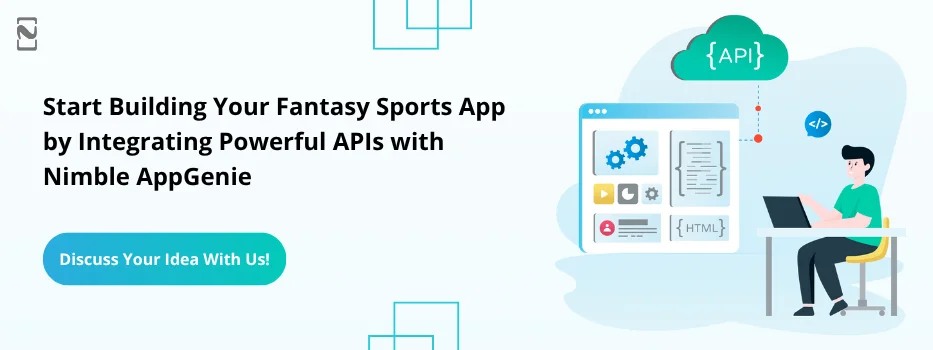
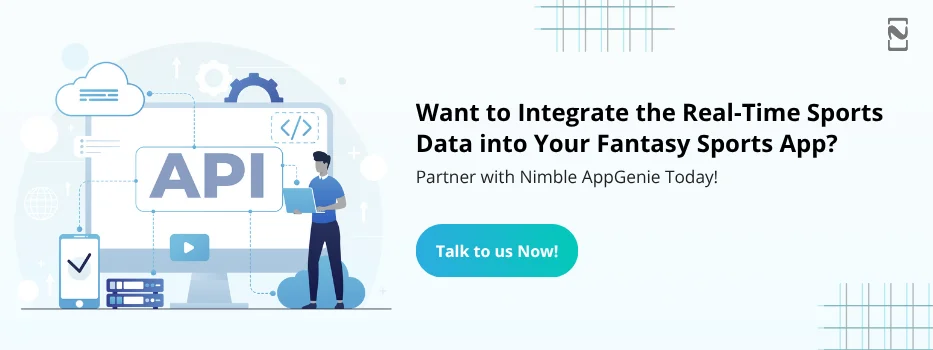
No Comments
Comments are closed.